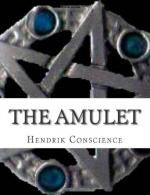Turchi drew a chair beside her, regarded her with an expression of profound compassion, and said:
“My poor Mary, your affliction is intense! I know by my own sorrow how your loving heart is suffering from this terrible suspense!”
The young girl lifted her eyes to his face, and she saw the tears running down his cheeks. Then she began to weep bitterly, and sobbing, she said:
“Thanks, thanks, Simon! I will beg Almighty God to recompense your affection and generosity.”
Simon’s countenance at this moment presented a singular appearance, from the remarkable contrast between the pallor of his cheeks and the deep scarlet which marked the margin of the scar on his face. The hypocrite could shed tears at pleasure and assume an expression of extreme sorrow, but the scar was not submissive to his will, and in spite of him its deepening red betrayed the wicked joy of his heart at the gentle and affectionate words of the young girl.
These words encouraged him to hope that he might fully attain the prize for which he strove. He had, it is true, taken from his murdered friend the proof of the debt of ten thousand crowns; true he had, as he supposed, buried all evidence of his crime in the subterranean vault; but this did not satisfy him. In order to feel that he had received the price of the frightful assassination, in order to remain rich, powerful, and honored, he required the hand of the beautiful Mary Van de Werve. He well knew that a long time must elapse before the consummation of his hopes; still, from the very day that he had committed the murder, he commenced to lay his schemes, weigh his words, and so direct his plans that sooner or later he would certainly take Geronimo’s place in Mary’s heart. He felt secure of the consent of the young girl’s father. It was on this account that he feigned excessive sorrow, and gazed upon Mary with tearful eyes, as though the sight of her grief pierced him to the heart.
He took Mary’s hands in his, and said:
“Do not yield, to despair, Mary; all hope is not lost. Last night a thought—a strange thought—occurred to my mind. And if I be correct, there are still well-founded reasons for expecting Geronimo’s return.”
“Speak, Simon,” said Mary, anxiously. “Tell us this thought.”
Signor Turchi cast down his eyes in feigned embarrassment.
“Impossible, Mary; it is a secret which I have no right to divulge.”
“Alas! is even this consolation refused me?” she exclaimed, despairingly.
“This is unkind, Simon,” said Mr. Van de Werve. “Why do you cheer us up and awaken our curiosity only to cast us down by your silence? Give no names; but at least give us some idea of the reasons we have for hope.”
Simon Turchi shrugged his shoulders.
“Ah, signor,” said Deodati, reproachfully, “you are ungenerous. This morning before ’Change you were about to confide the secret to me, when you were interrupted by the approach of friends. Tell it to me now.”




